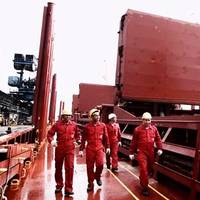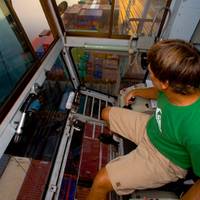Can Employers Ask About Prescription Drug Use?

On the waterfront, it all depends. It is well established that workplace safety and productivity can be compromised, not just by the use of illicit substances and alcohol, but also by the use of prescription drugs. Federal law, however, imposes limits on employer inquiries in this area both with respect to the affected job classifications and the scope of the inquiry. Generally, an employer may not ask all employees what prescription medications they are taking because such an inquiry is not job-related and consistent with business necessity, according to Enforcement Guidance from the U.S.
Venture Insurance Programs Acquires Tidal Solutions
Venture will rebrand and integrate Tidal Solutions specialty commercial marine products into its portfolio of industry leading programs. Venture Insurance Programs, a national insurance program administrator, today announced it has acquired Tidal Solutions, LLC, a Charlotte, NC-based managing general underwriter serving the North American specialty commercial marine market. Venture will integrate the Tidal Solutions marine products into its portfolio of industry specific insurance programs. The products, which include Hull & Machinery, Protection & Indemnity, General Liability and Maritime Employer’s Liability coverage, will be marketed nationwide by Venture under the brand TIDAL MARINE through Venture’s agent and broker network.
Suppression of Random Drug Test Results: A Bad and Unnecessary Decision

Last September, an Administrative Law Judge (ALJ) unsettled much of the U.S. maritime industry when he dismissed with prejudice a U.S. Coast Guard (USCG) action to revoke a Merchant Mariner’s Credential (MMC) despite his finding that the mariner’s urine had tested positive for cocaine. The case is referred to as USCG v. Hopper, SR-2014-14. American Maritime Safety, Inc. (AMS) considered the Hopper outcome to be a bad decision, both because it imposes harsh evidentiary consequences…
The Treatment of Foreign Seafarers
The United States effectively treats foreign seafarers more harshly than any other group that enters the country without breaking the law. The general rule is that all persons who are not U.S. nationals or permanent residents must have a visa to enter the United States. Persons desiring to become U.S. citizens or permanent residents must obtain an immigrant visa. Most other persons desiring to enter the United States for a limited period of time must obtain a nonimmigrant visa. To obtain a nonimmigrant visa, one must have a valid passport and complete the Nonimmigrant Visa Application, Form DS-160 and submit it and a photograph (head shot) to the relevant U.S. embassy or consulate.
MLC Amendments Address Abandonments, Claims
Governments, maritime employer representatives coordinated by the International Shipping Federation (ISF) and their counterparts from the International Transport Workers’ Federation (ITF) met this week at the International Labor Organization in Geneva for the first meeting of the Special Tripartite Committee (STC) established under the Maritime Labor Convention, 2006 (MLC, 2006). During the meeting, an agreement was reached for amendments to the Convention to ensure the provision of financial security systems to assist seafarers in the event of their abandonment and for compensation for seafarers’ contractual claims for death and personal injury.
Seafarers Gain ILO Minimum Wage Increase

ITF representatives met with maritime employer representatives from the International Shipping Federation (ISF) at the ILO recently for discussions. The sub-committee on wages of seafarers of the joint maritime commission agreed to increase the ILO monthly minimum wage from USD585 to USD592 from 1 January 2015. On 1 January 2016, this will increase to USD614. Henrik Berlau, national secretary of Denmark’s Fagligt Faelles Forbund (3F), was one of the ITF representatives in attendance. He spoke on behalf of the ITF seafarers’ group during the two-day meeting.
Minimum Wage Increase for the Able Seafarer
Maritime Employer representatives, coordinated by the International Shipping Federation (ISF), met with International Transport Workers’ Federation (ITF) counterparts this week at the International Labor Organization to review the ILO recommended minimum wage for the Able Seafarer. It was agreed that from January 1, 2015, the ILO minimum monthly basic wage for an AB is increased to $592 (USD) and from January 1, 2016, the basic wage is increased to $614. ISF spokesperson Arthur Bowring led the Shipowner Group in the discussions held on February 26 and 27, 2014 in Geneva. In his opening statement, Bowring reflected that the current figure of $585 came into effect on December 31…
Maritime Mentoring

There are very few forms of learning which are as effective and personal as mentoring. And nowhere is mentoring more important than it is in the maritime industry. It is with this in mind that a group of volunteers have created the on-line “International Maritime Mentoring Community” at www.MaritimeMentors.com. This is a 100% volunteer/free site that exists only for the betterment of the maritime industry. If you are a maritime worker, are considering a job in the maritime industry, or if you represent a maritime college or maritime employer, the site is here for you.
Foss Recieves Safety Award on West Coast
A major maritime employer group has recognized the outstanding safety record of the Foss Maritime workers who tie up and release ships at Puget Sound ports. The Pacific Maritime Association (PMA) - whose members include key Foss customers - honored the company's ongoing commitment to safety and accident prevention with four awards. Foremost was the recognition of Foss Line Service for reducing its annual injury rate more than any of its Washington state-based competitors. Foss line-handlers recorded no time lost for injuries in 2010. Gary Faber, President and COO of Foss Maritime, lauded Foss Line Service's achievement: "Our customers expect this, which is why we appreciate the recognition coming from the Pacific Maritime Association.
Seaman or Longshoreman: The Zone of Uncertainty

Historically in our industry, there has been a clear dichotomy between companies whose employees are seamen that are covered by the Jones Act and those that are longshoremen and covered by the Longshore and Harbor Workers’ Compensation Act (LHWCA). The difference was very simple, Jones Act employers and their seamen were responsible for vessel-based duties and operations. Longshore employers hired longshoremen that were land-based although they performed a portion of their duties aboard vessels.
Retaining New Hire in the Workboat Industry

Academy graduates entering their first job with a maritime employer will leave the position within the first year almost 50% of the time. This rate is many times greater than the national average for college graduates in their first job after graduation — except for RN’s (47% leave within a year). Registered Nurses and Maritime Academy graduates often cite the same reasons for leaving a position within this first year. A new hire in the nursing field is cited as costing $30,000…
Accumulated Time Off Pay System Upheld
In an unpublished decision, the U.S. Court of Appeals for the Fifth Circuit upheld the validity of the accumulated time off (ATO) pay system. In the instant case, the employment contract provided that the maritime employee worked for 30 days and was then off work for 15 or 30 days. Part of his pay was deferred so that he was paid during time he was not working. Plaintiff sued his maritime employer, alleging that he was entitled to interest on deferred wages or that his wages should not have been deferred. The court held the ATO pay system is well-recognized, that plaintiff signed an employment contract acknowledging the system, and that plaintiff had on various occasions withdrawn monies early from his deferment account as permitted under the ATO pay system. Craven v.
An Exception to the Divers' Exception?
By James P. Nader & Rudolph F. An occupational study estimates that the number of commercial diving positions nationwide will grow to an anticipated total of 5,000 positions over the next decade. For the uninitiated, the focus of these commercial divers spans the gamut from extensive inspection of hulls and pipelines to the construction and repair of underwater structures to the demolition and removal of underwater obstacles, and onwards to the search and rescue of people and missing objects. While the commercial diving industry is certainly diverse, every diver shares a certain level of risk of injury when entering the water. Therefore…
Negligence Under the Jones Act
The U.S. Court of Appeals for the Ninth Circuit ruled that a maritime employer may be liable to an injured seaman if its failure to comply with a Coast Guard regulation played any part, even the slightest, in producing the injury. In the instant case, plaintiff deckhand was periodically required to do free dives (dives without scuba gear) to retrieve mooring lines that had sunk to the sea floor. Plaintiff was an experienced free diver. On one occasion, plaintiff failed to properly equalize the hyperbaric pressure in his left ear on descent and suffered injury. Plaintiff brought suit against his employer alleging, among other things, that defendant failed to have a diving operations manual as required by US Coast Guard regulations.
Rules For FOC Vessels To Come
Negotiations to adopt international working conditions for seafarers on flag of convenience (FoC) vessels will start for the first time next year. It is the first time shipping employers and unions have agreed to negotiate voluntary terms and conditions on an international level, the International Transport Workers Federation (ITF) and the International Maritime Employer Committee (IMEC ) said in a joint statement. "Negotiations will start in February 2000 which will lead to the adoption of a model agreement covering the terms and conditions of employment acceptable to employers and the ITF, which can be brought into effect from January 1, 2001," they said.









